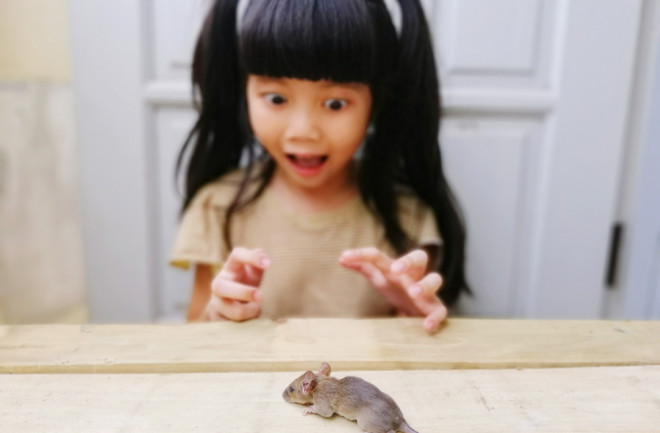In 2011, my husband and I moved into our first home, a small beach shack atop wooden stilts a few blocks off the beach in South Carolina. The house was a dream aside from the overstuffed marsh rats that scurried across the basement floor morning, noon, and night. When their whiskers twitched, they revealed razor-sharp front teeth, and their furless tails dangled behind them like a wedding train. Memories of those rats still send shivers up my spine.
It doesn’t matter how laid back you are when a mouse or rat scampers across the room; you can’t help but scream. But why? Find out if musophobia is written into our DNA or if it is a learned behavior.
What Is Musophobia?
Musophobia is known as an irrational fear of mice and rats. You might fear all rodents or a particular species with which you previously had a scary encounter. A phobia of rodents is common because we know they carry disease, have sharp teeth, and generally like to infest the places we live. But at the same time, it can get out of control.
Symptoms of Musophobia
Musophobia may cause anxiety, panic attacks, avoidance of areas where you fear rodents might live, feelings of helplessness, obsessive thoughts, nightmares, obsessive-compulsive behaviors, and depression.
The Difference Between a Fear and a Phobia
While fear tells you to be cautious around a rodent, not to pet it, and to keep your distance, a phobia renders panic where you can’t do anything about the situation because you’re frozen in fear. If your reaction to rodents seems irrational, talk to a mental health professional about the root of your phobia and what might be done about it.
Read More: From Clowns to Buttons, These Weird Phobias Afflict Many People
Why Are We Afraid of Mice and Rodents?
The fear of mice and other rodents can be attributed to a combination of evolutionary, cultural, and personal factors.
Human Evolution and Fear of Rodents
The danger around rodents makes sense because they are notorious spreaders of disease. Our brains have evolved over 300,000 years of history, and it all revolves around our survival, says psychotherapist Carl Nassar of the Culture Lab. Much of the evolution is positive — for example, our connection and belonging to one another. Other portions of it are ingrained in fear. “There was very good reason to want to keep our distance from rats and mice,” says Nassar.
According to the Centers for Disease Control and Prevention (CDC), the bacteria that is known to have caused the plague, called Yersinia pestis, is transmitted through the fleas that live on mice, wood rats, voles, squirrels, groundhogs, and other rodents. However, the Black Death, which wiped out anywhere from a third to half of Europe’s population in the 14th century, was caused by the same flea that likely jumped between humans, who also lacked basic hygiene during the Middle Ages. Still, a healthy fear of rodents isn’t that surprising.
Early Trauma and Rodent Phobia
While most of us fear or don’t like small rodents, a smaller portion of us have a phobia that may stem from a childhood trauma that led us to fear rodents into adulthood. For example, if a dog bit you when you were a child, then you might be scared of dogs today. Children or adults may have a fear of animals, such as rodents, that stems from long ago. “We can think of many things that mice and rats could do, from biting us to causing damage to our homes, that could give you good reason to fear them,” says Nassar.
Read More: Why We're Hard-Wired to Remember Things That Scare Us
Our Startle Response to Mice and Rats
When we see a rat waddle across the sidewalk or a mouse shoot across the living room, we’re likely to have a startled response. We may jump back in horror or screech at the top of our lungs. This is an evolutionary ‘fight or flight’ response that causes us to be startled when we are surprised. “We’re short-circuiting the part of the brain that has executive functioning and will thoughtfully and rationally make a decision,” says Nassar.
This “archaic” part of the brain is only concerned with survival, with the typical responses being fight, flight, or freeze. When we put the sympathetic nervous system in the driver’s seat, our blood pressure rises, pupils dilate, we become tense, and we might even lose control of our bladder or bowels.
A fear of rodents is a natural part of being human, even though some species are cuter than others. No matter, I’m still jumping on the counter with a broom in hand if I see one of those fury fellows galavanting across my kitchen.
Read More: Causes of Phobias Can Be Complicated

